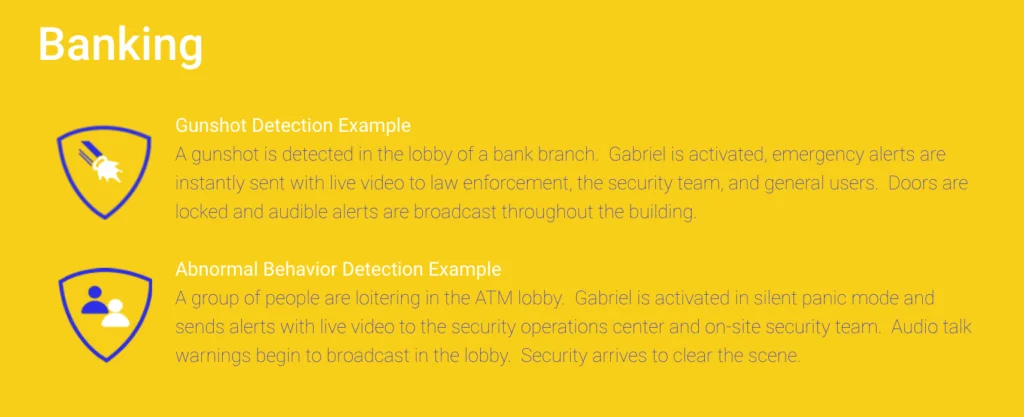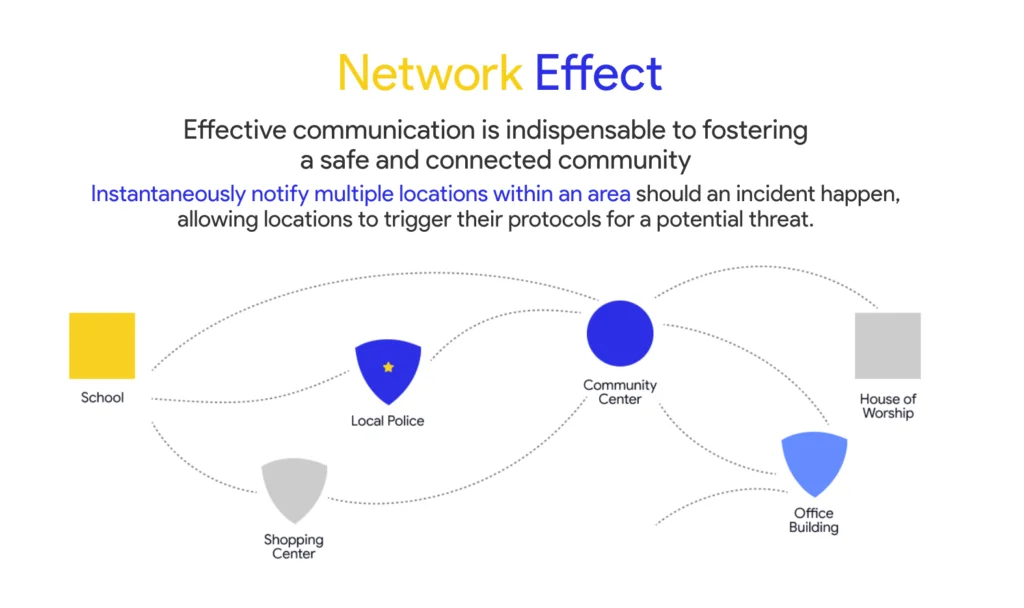CIA and Mossad-linked Surveillance System Quietly Being Installed Throughout the US
CIA and Mossad-linked Surveillance System Quietly Being Installed Throughout the US
Launched in 2016 in response to a Tel Aviv shooting and the Pulse Nightclub shooting in Orlando, Florida, Gabriel offers a suite of surveillance products for “security and safety” incidents at “so-called soft targets and communal spaces, including schools, community centers, synagogues and churches.” The company makes the lofty promise that its products “stop mass shootings.” According to a 2018 report on Gabriel published in the Jerusalem Post, there were an estimated 475,000 such “soft targets” across the U.S., meaning that “the potential market for Gabriel is huge.”
Gabriel, since its founding, has been backed by “an impressive group of leaders,” mainly “former leaders of Mossad, Shin Bet [Israel’s domestic intelligence agency], FBI and CIA.” In recent years, even more former leaders of Israeli and American intelligence agencies have found their way onto Gabriel’s advisory board and have promoted the company’s products.
While the adoption of its surveillance technology was slower than expected in the United States, that dramatically changed last year, when an “anonymous philanthropist” gave the company $1 million to begin installing its products throughout schools, houses of worship and community centers throughout the country. That same “philanthropist” has promised to recruit others to match his donation, with the ultimate goal of installing Gabriel’s system in “every single synagogue, school and campus community in the country.”
With this CIA, FBI and Mossad-backed system now being installed throughout the United States for “free,” it is worth taking a critical look at Gabriel and its products, particularly the company’s future vision for its surveillance system. Perhaps unsurprisingly, much of the company’s future vision coincides with the vision of the intelligence agencies backing it – pre-crime, robotic policing and biometric surveillance.
“Safety” Through Invasive Surveillance
As noted elsewhere on the company’s website, Gabriel is looking to expand far beyond schools and houses of worship to retail stores, warehouses, data centers and banks. At these other facilities, it specifically promotes its “abnormal behavior” detection capabilities. One example, given in reference to how its products might be used in the banking sector, states the following as an “abnormal behavior detection example”:
A group of people are loitering in the ATM lobby. Gabriel is activated in silent panic mode and sends alerts with live video to the security operations center and on-site security team. Audio talk warnings begin to broadcast in the lobby. Security arrives to clear the scene.
Another example, this time for the retail sector, notes how Gabriel surveillance cameras would activate alerts when they detect “unusual movements.” Yet another example for warehouses and distribution centers notes how facial recognition functionality could be used to activate “silent panic mode” when a terminated employee is detected on the premises.

One of the hallmarks of the Gabriel system versus other systems, per the company, is its heavy reliance on AI and machine learning. As noted on their website, “we are disrupting the security industry by replacing legacy security systems dependent on human interaction with automated systems that reduce response time, chaos and cost.” That “disruption” is predicated in part on Gabriel’s commitment to “innovation,” which has prompted them to integrate what they call “preventative capabilities” into its platform. The company also notes that they have “already begun integrating [the Gabriel system] with cutting edge technologies such as weapons detection, security drones, robotics and smart cameras.”
There is little further information available about the company’s efforts to integrate their system with security drones and robotics. Many security drones are currently on the market for use in homes, industrial sites and other types of locations, as are security robots, such as the robot “dogs” created by the Hyundai-owned company Boston Dynamics that are currently used by some U.S. law enforcement agencies. This, of course, means that Gabriel’s ambitions in this regard are likely to become reality sooner rather than later. What is worth noting, however, is that drones and robots alike can easily be “upgraded” to wield deadly weapons. With Gabriel’s technology in mind, the Orwellian possibility of having an entirely automated response to various types of incidents, including those arising from the detection of “abnormal behavior,” that could include the use of deadly force no longer seem as futuristic or far-fetched as they once did.
Also important to note is the company’s intended goal of offering predictive policing (i.e., pre-crime) functionalities. They state that: “In the future, we see a security platform [i.e., a future iteration of Gabriel’s products] that can anticipate a mass causality [sic] events based on human behavior, identify mass casualty threats prior to the first action taken, and automate alerting to inform potential victims before any harm is done.” Predictive policing has been a major goal of companies deeply tied to the CIA, as well as Israeli intelligence for a number of years, with the most well-known of these being Palantir.
Gabriel’s systems, once installed, offer complete yet invasive surveillance of civilian areas. While the schools and community centers that Gabriel most often courts have been sporadically targeted by shooters over the past few decades, these are often places that are traditionally uninterested in implementing AI-driven surveillance solutions on their premises. Yet, such places must become “connected” if the future paradigm of complete connectivity between all people and places (e.g., the internet of things, the internet of places, the internet of bodies) is to come to pass. Indeed, this paradigm is necessary to further the connections between the digital and physical worlds that are seen as necessary to usher in the so-called 4th industrial revolution, or 4IR (which itself has been described as the “fusion” of the physical and digital realms).
Notably, Gabriel’s products are meant to form a network equivalent to “the internet of places,” which is a “specialization of the internet of things” that allows buildings to be “instrumentally empowered through sensors, data sharing, and computation.” Gabriel openly touts the “network effect” of its products when they are installed in multiple buildings in the same area, creating a “safe and connected community.” While Gabriel casts this “network effect” as helping to keep entire communities safe, it also benefits the implementation of the “smart city” model, which utilizes the internet of things and ubiquitous sensors and cameras to harvest massive troves of data that are then used to “manage service delivery,” with those services including the deployment of law enforcement.

The main drivers (and builders) of the “smart city” and “internet of things” paradigms are, of course, Big Tech. It is worth noting that, despite marketing itself as a company aimed at thwarting mass shootings when and before they occur, Gabriel has also been actively courting the “Big 5” tech behemoths of Silicon Valley – Google, Amazon, Meta (formerly Facebook), Apple and Microsoft. Speaking to the Times of Israel last year, Gabriel’s co-founder Yoni Sherizen stated that:
Our product is now being adopted by the banking and financial services sector and we have some pilots with some of the biggest technology companies, the Big 5. So, we’re looking at data centers, corporate offices or campuses, manufacturing facilities for pharmaceuticals and other essential goods… [we’re] protecting a whole variety of different types of spaces.
The Wind Beneath Gabriel’s Wings
While mass casualty events in the United States are dreadful and could likely be mitigated to some extent by technologies like those offered by Gabriel, the company’s deep connections to Israeli and American intelligence agencies, which have been seeking to utilize such technologies for ulterior ends, are a cause for concern.
When I first wrote about Gabriel in 2019, their board of advisors included four individuals. They included Ram Ben-Barak, former deputy director of Mossad and former director-general of Israel’s intelligence ministry; Yohanan Danino, former chief of police for the state of Israel; Kobi Mor, former director of overseas mission for the Israeli intelligence agency Shin Bet; and Ryan Petty, the father of a Parkland shooting victim and friend of former Florida governor (and current Florida senator) Rick Scott. At the time, Petty was the only American on the board.
Since then, Gabriel has been courting American schools, business and other institutions much more aggressively and have added more Americans to its advisory board. These include Bob Pocica, former FBI Special Agent, former Senior Director for Global Security at Pfizer and Senior Advisor to the Chertoff Group (as in former head of the Department of Homeland Security, Michael Chertoff), and Don Hepburn, former CIA executive for 26 years as well as a former FBI Deputy Assistant Director. Also added was Menachem Pakman, who worked as a senior executive for Israel’s Prime Minister’s Office for over 30 years and is an expert in “intelligence, security and counterterrorism.”

While it is certainly possible that these numerous former officials from American and Israeli intelligence may have no ulterior motive in advising Gabriel, it is important to note that the leaders of Israeli military intelligence and Mossad don’t see it that way. As I’ve detailed in several previous reports, Israel’s Calcalist Tech published a report in 2019 which noted that “since 2012, cyber-related and intelligence projects that were previously carried out in-house in the Israeli military and Israel’s main intelligence arms are transferred to companies that in some cases were built for this exact purpose.” It later states that:
In some cases, managers of development projects in the Israeli military and intelligence arms were encouraged to form their own companies which then took over the [military and/or intelligence] project.
It’s not exactly clear why Israel’s military intelligence and other intelligence agencies decided to begin outsourcing its operations in 2012, though Calcalist Tech suggests the reasoning was related to the difference in wages between the private sector and the public sector, with pay being much higher in the former. However, 2012 was also the year that American hedge fund manager Paul Singer — together with Benjamin Netanyahu’s long-time economic adviser and former chair of the Israeli National Economic Council, Eugene Kandel — decided to create Start-Up Nation Central (SUNC).
As I previously reported for MintPress News, SUNC was founded as part of a deliberate Israeli government effort to counter the nonviolent Boycott, Divest and Sanctions (BDS) movement and to make Israel the dominant global “cyber power.” This policy is aimed at increasing Israel’s diplomatic power and specifically undermining BDS as well as any national or international efforts to hold Israel’s government accountable for war crimes and violations of international law in relation to the Palestinians. The goal is to have other countries become so dependent on Israeli companies, and more specifically technology companies, that they are unable to effectively challenge Israeli domestic or foreign policy.
In 2018, Netanyahu was asked by Fox News host Mark Levin whether the large growth seen in recent years in Israel’s technology sector, specifically tech start-ups, was part of Netanyahu’s plan. Netanyahu responded, “That’s very much my plan … It’s a very deliberate policy.” He later added that “Israel had technology because the military, especially military intelligence, produced a lot of capabilities. These incredibly gifted young men and women who come out of the military or the Mossad, they want to start their start-ups.”
Netanyahu again outlined this policy a year later at the 2019 Cybertech Conference in Tel Aviv, where he stated that Israel’s emergence as one of the top five “cyber powers” had “required allowing this combination of military intelligence, academia and industry to converge in one place” and that this further required allowing “our graduates of our military and intelligence units to merge into companies with local partners and foreign partners.”
This merging of “military intelligence, academia and industry” has also been openly acknowledged by former Mossad Director Tamir Pardo, who stated in 2017 that “everyone” in the Israeli cybertechnology sector is an “alumni” of either Israeli intelligence, like the Mossad, or Israeli military intelligence, like Unit 8200 (Israel’s equivalent of the National Security Agency, or NSA). Pardo even went as far as to say that the Mossad itself is “like a start-up.”
Pardo would know. After leaving his post as Mossad director in 2016, he dove straight into the world of Israeli tech start-ups, becoming chairman of Sepio Systems, whose two CEOs are former Unit 8200 officers. Sepio Systems’ advisory board includes the former chief information security officer of the CIA, Robert Bigman, and former head of the Israel National Cyber Bureau and veteran of Israeli military intelligence, Rami Efrati. Sepio Systems’ cybersecurity software has been adopted by several banks, telecom and insurance companies, including in the U.S. and Brazil.
Now that we’ve established that numerous Israeli tech-focused companies are known to be operating as fronts for intelligence, the question arises of whether Gabriel is one such company. While it is difficult to know for sure, several companies that have been outed as fronts, such as the Jeffrey Epstein and Ehud Barak-connected Carbyne, have been involved in creating and implementing the necessary structure for a “pre-crime” approach to law enforcement in the United States. Gabriel’s vision for a fully automated system that can use predictive analytics of human behavior to stop crimes before they happen is eerily similar to the same vision espoused by Carbyne before their ties to Epstein and Israeli intelligence were outed very publicly in 2019.
The use of “pre-crime”, as detailed in sci-fi epics like Phillip K. Dick’s The Minority Report, has deeply unsettling implications for society, civil liberties and the future of policing. As noted by the British Journal of Criminology, “pre-crime links coercive state actions to suspicion without the need for charge, prosecution or conviction” and is part of a larger trend “towards integrating national security [e.g., intelligence agencies] into criminal justice.” Indeed, as I have noted in my work for many years now, American and Israeli intelligence agencies, particularly their most nefarious components, have covertly been the drivers of “pre-crime” protocols meant to eliminate public dissent since the 1980s, if not even earlier.
These early “pre-crime” systems, like those in the works today, have long been dependent on technology as well as mass surveillance as a means of profiling would-be dissidents. The software key to these early iterations was the PROMIS software, which was stolen by Israeli intelligence operatives in conjunction with the U.S. Department of Justice and used to profile and track people as well as cash flows in the U.S. and beyond. U.S. national security officials involved in the Iran-Contra scandal used PROMIS to create the “Main Core” database, still in use today, which lists those Americans deemed “dangerous” in the event of a vaguely defined “national emergency” that could threaten “continuity of government.” As I’ve previously noted, Israeli intelligence played an integral role in the development of Main Core.
Today, pre-crime is already here, though it is currently reserved for special cases as opposed to the main approach of U.S. law enforcement. In 2019, then-Attorney General William Barr formally adopted pre-crime as Department of Justice policy via a program called DEEP (Disruption and Early Engagement Program). Since then, the Biden administration’s War on Domestic Terror framework is largely predicated on pre-crime and aims to pick up where Barr left off. In order to have an effective pre-crime system, one needs the necessary infrastructure. That infrastructure is currently being provided by several companies with overt ties to intelligence, such as Mark43, Carbyne and Gabriel.
Yet, while Mark43 and Carbyne target law enforcement and emergency services, respectively, Gabriel is installing the infrastructure necessary for pre-crime directly into places of business, leisure, learning and worship. Its focus – schools, houses of worship and community centers – are places that would normally not purchase such invasive technology. Yet, Gabriel’s fear-driven marketing focusing on mass shootings (which notably mirrors Carbyne’s own marketing efforts) have prompted some to buy in.
Enter the “anonymous philanthropist” mentioned at the beginning of this article. Per reports, that “anonymous philanthropist” is providing the money needed to place Gabriel’s products in schools, houses of worship and campuses throughout the United States “for free.” As noted by the Israeli outlet No Camels, Sherizen shared that “[the philanthropist’s] vision is to actually cover every single school and synagogue and get everyone on the same platform.”What a boon for Gabriel’s “network effect” and broader pre-crime ambitions.
The anonymity of this “philanthropist” is notable as the term “philanthropist” has been used to launder the reputations of notoriously corrupt and cutthroat businessmen for generations. If one remembers back to the Jeffrey Epstein case, the intelligence-linked pedophile was widely hailed as a “philanthropist” before his covert and illicit activities became more widely known. It also begs the question – what kind of “philanthropist” would want pre-crime surveillance infrastructure in every school in the country? The story supplied by Gabriel’s co-founder could easily be cover for the same intelligence agencies backing Gabriel and related companies and we would do well to better scrutinize the technology being used to study and surveil our children and our communities.
Source: Unlimited Hangout




Comments
Post a Comment